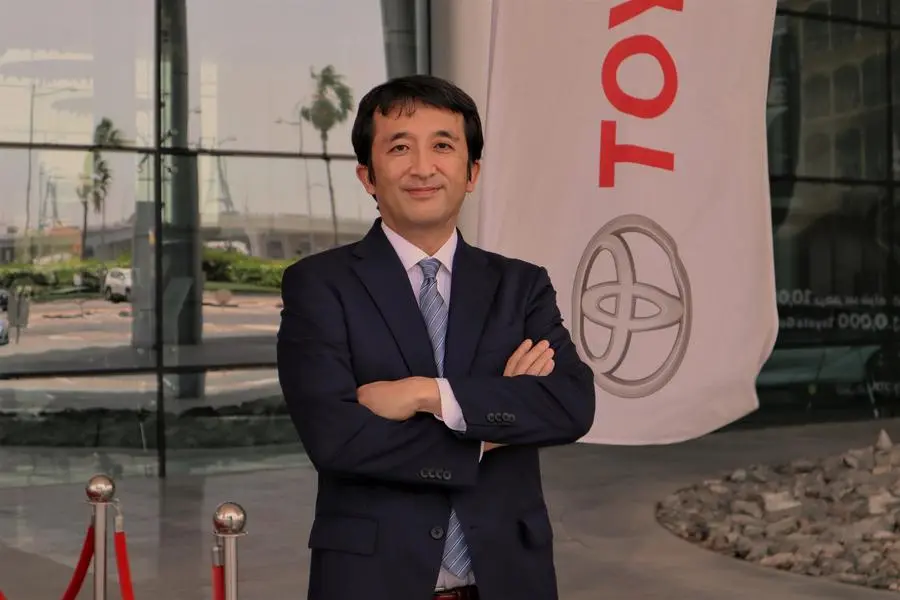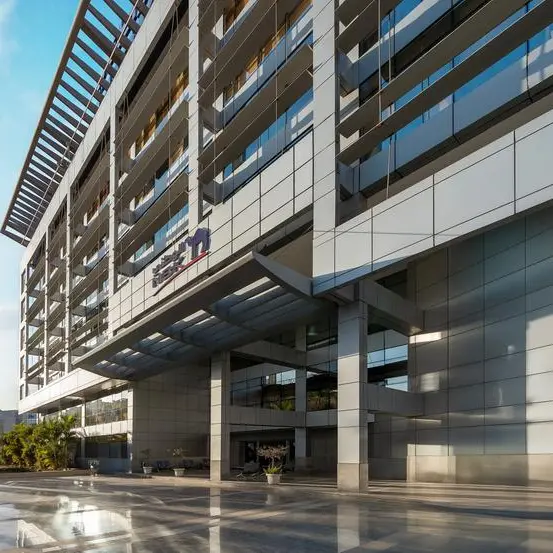PHOTO
Dubai, United Arab Emirates: This month, the first-ever United Nations MENA Climate Week will be held today from 28 to 31 March in Dubai, United Arab Emirates, which will bring together key stakeholders to take the pulse of climate action in the region, discuss climate challenges, and explore opportunities. One of the companies at the forefront of global efforts on climate action, particularly in achieving carbon neutrality within the mobility sector, is Toyota. Long-recognized as a pioneer in the development of eco-friendly vehicles, Toyota has adopted a multi-faceted approach that emphasizes ‘Sustainable and Practical’ solutions.
Kei Fujita, Chief Representative, Middle East and Central Asia Representative Office, Toyota Motor Corporation, says: “Carbon neutrality is a goal with many paths. At Toyota, we understand that eco-friendly solutions can contribute to the environment only when their use becomes widespread. There is no ‘one size fits all’ answer to today’s climate challenges, which is why we focus on developing and implementing a diverse range of technologies.”
In 1997, Toyota launched the Prius, the world’s first mass-production Hybrid Electric Vehicle (HEV). Today, the company has sold more than 19 million electrified vehicles[1] worldwide and has invested in the development of a full range of innovative Hybrid Electric Vehicles (HEVs), Plug-in Hybrid Electric Vehicles (PHEVs), Battery Electric Vehicles (BEVs), and Fuel Cell Electric Vehicles (FCEVs). Toyota’s commitment to pursuing electrification from all directions comes as part of its strategy to respond flexibly to the global demand for diverse mobility solutions.
Fujita explains: “We know the ways our customers use their vehicles vary from one person to another. Drivers also have to contend with diverse road and climate conditions around the world, from rough roads and desert environments to freezing cold climates and everything in-between. Therefore, it is natural that what ‘Sustainable and Practical’ means varies from region to region. If we look at powertrains, for instance, each type comes with its own strengths and weaknesses.”
“To give an example, HEVs are the most practical solution in places with limited charging infrastructure and can achieve around 25 km/L with no special equipment or changes to the existing infrastructure. On the other hand, PHEVs offer a greater driving range in EV mode, but charging infrastructure is needed. When it comes to zero emissions solutions, BEVs are better suited to smaller vehicles and short-distance driving as they require a longer time to fully recharge the battery, while FCEV can be more suitable to larger vehicles that cover longer distances. As you can see, there is no single best solution that works for all use cases in all parts of the world; this is why we remain committed to developing various solutions to fulfill the needs of different markets,” he adds.
Toyota’s sales of electrified vehicles currently represent 16% of total sales in the Middle East. This percentage is increasing year on year, demonstrating a growing public awareness on the benefits electrified vehicles offer in terms of efficiency, performance, and sustainability. The company has the biggest line-up of electrified vehicles in the region, with a total of ten Hybrid Electric models including the Corolla, Camry, C-HR, RAV4, Corolla Cross, and Highlander, together with the Lexus ES, LS, NX, and RX.
According to Fujita: “Customer needs are not uniform throughout the world, and can even differ among regions within individual countries. Toyota will continue to expand its lineup of electrified vehicles on a global basis to meet the needs of each country. Over the three decades since the launch of the Prius, we have accumulated data and steadily refined our technologies to develop a wide range of products.”
In December 2021, Toyota announced its strategy for Battery Electric Vehicles (BEVs). The company plans to launch 30 models in the passenger and commercial segments by 2030, and aims to achieve 3.5 million annual global vehicle sales before the end of the decade.
With the launch of its ‘Environmental Challenge 2050’ roadmap in October 2015, Toyota outlined its commitment to reducing the environmental impacts of manufacturing and driving vehicles across the globe, with the goal of achieving carbon neutrality throughout its operations. The company has set a series of ambitious targets inspired by key United Nations Sustainable Development Goals (SDGs), placing its current and future strategy firmly in alignment with the MENA Climate Week event taking place this month in Dubai.
Fujita concludes: “Our adoption of ‘Sustainable and Practical’ solutions for diverse circumstances around the world is exactly what the phrase ‘think globally, act locally’ means to me. I sincerely believe this is the most effective way to reduce the amount of carbon emitted into the atmosphere in the quickest time possible, a goal that is imperative if we are to safeguard our planet for future generations. With this in mind, we remain committed to pursuing various technology options including HEV, PHEV, BEV, and FCEV as we continue on our journey towards ‘Creating Mobility For All’ and ‘Producing Happiness for All.’”
-Ends-
Toyota UAE Social Media Handles
Facebook: @ToyotaUAE
Instagram: @Toyotauae
YouTube: Toyota UAE
Twitter: @Toyota_UAE
About Al-Futtaim Toyota
Toyota, a Japanese automotive manufacturer founded in 1937, is the world's market leader in sales of hybrid electric vehicles. Toyota has been exclusively distributed in the UAE by Al-Futtaim Automotive, part of Al-Futtaim Group, for over six decades, and has been leading the sustainable mobility movement since 2008.
With a large line-up of vehicles ranging from SUV, compact, sedan, coupe, MPV and LCV, as well as a wide range of Hybrid options, Al-Futtaim Toyota is setting new benchmarks for clean motoring in an effort to actively contribute to a lower carbon footprint in the UAE. 2017 saw the introduction of the zero-emission hydrogen-powered Fuel Cell Electric Vehicle (FCEV) Toyota Mirai, in a pilot aiming at studying the possibilities of establishing a hydrogen-based, carbon-free society.
Toyota’s line-up features several hybrid vehicles including the sporty, practical and environmentally friendly RAV4, the C-HR, an innovative compact SUV, the seven-seater Highlander which is the brands biggest HEV to date, the powerful and efficient Corolla and the sleek and sophisticated Camry.
In September 2019, after a 17-year wait, Al-Futtaim Toyota launched the new 2020 Toyota GR Supra in the UAE, much to the delight of fans and loyalists across the country. With the all-new fifth-generation model, the legendary name returned to set the roads ablaze with a comeback only fitting of the Toyota Supra story, with the 2021 version launching a year later in October 2020.
In August 2020 Al-Futtaim Toyota shook up the lifestyle pickup segment with the introduction of the all-new eighth-generation Toyota Hilux Adventure. This was the first time ever that the Hilux is available as a retail model in the UAE, meaning that it is no longer limited to dominating the commercial-use sector.
For more information and to book a test drive of the latest Toyota models please visit www.toyota.ae
About Al-Futtaim Automotive
Al-Futtaim Automotive, one of the main five operating divisions within the UAE-based Al-Futtaim Group of companies, is a conglomerate of motoring-related businesses, franchising some of the world’s most-recognized automotive brands and services.
Operating in 10 countries across the Middle East, Asia and Africa and empowered by around 9,000 associates, the UAE-headquartered Group’s services span across distribution of new and used vehicles, manufacturing, leasing, and aftersales.
Ranging from passenger cars to SUVs, commercial vehicles, industrial and construction equipment as well as motorbikes and quads, Al-Futtaim Automotive Group offers an integrative customer-centric experience for motorists, fleet operators and contractors alike, and strives to become the leader in tailor-made mobility solutions.
About Al-Futtaim
Established in the 1930s as a trading business, Al-Futtaim Group today is one of the most diversified and progressive, privately held regional businesses headquartered in Dubai, United Arab Emirates.
Structured into five operating divisions; automotive, financial services, real estate, retail and health; employing more than 33,000 employees in more than 20 countries in the Middle East, Asia and Africa, we partner with over 200 of the world's most admired and innovative brands.
Al-Futtaim’s entrepreneurship and relentless customer focus enables the organization to continue to grow and expand; responding to the changing needs of our customers within the societies in which we operate.
By upholding our values of respect, excellence, collaboration, integrity; Al-Futtaim continues to enrich the lives and aspirations of our customers each and every day. For more information visit: www.alfuttaim.com.
Contacts for media:
Hicham Younis | PR Manager Toyota | Hicham.younis@alfuttaim.com
Nour Aboulaban | PR Manager, Gambit Communications | nour@gambit.ae




















